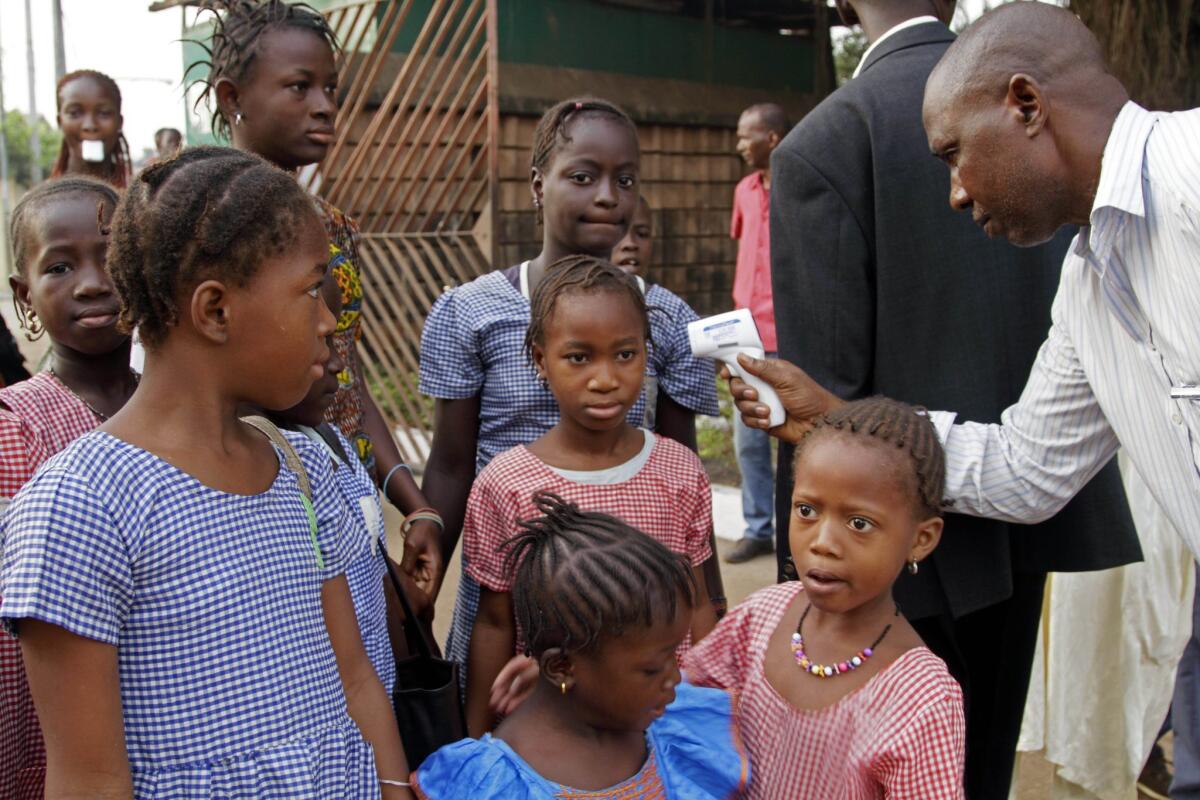Measles vaccination campaign urged in Ebola-stricken nations

- Share via
The disruption of healthcare services in West Africa’s Ebola-affected nations has resulted in a growing pool of children who remain unvaccinated for measles and could trigger a regional outbreak capable of infecting up to a quarter million people, researchers warn.
Even as the Ebola epidemic appears to be tapering off, damage to local healthcare systems “could lead to a second infectious disease crisis that could kill as many as, if not more than, the original outbreak,” researchers wrote Thursday in the journal Science.
According to researchers, measles susceptibility has been growing in the three nations most heavily impacted by Ebola -- Liberia, Guinea and Sierra Leone. Each of those nations had planned measles vaccination campaigns before the Ebola epidemic, but in the wake of the outbreak, vaccination rates have fallen by 75%, researchers say.
After an 18-month period of healthcare disruption, researchers estimated that a measles outbreak could infect 127,000 to 227,000 people, and cause 2,000 to 16,000 deaths.
To date, the Ebola epidemic has killed at least 9,961 and sickened 24,247, according to World Health Organization estimates.
“At the very least, a campaign should target children 6 months to 5 years of age,” wrote senior study author Justin Lessler -- an epidemiologist at the Johns Hopkins Bloomberg School of Public Health -- and his colleagues.
“Simultaneous deployment of additional key public health interventions, such as vitamin A supplementation and insecticide-treated bed nets, should also be considered,” authors wrote.
Measles is a highly infectious virus that causes a fever and rash, but can also cause serious health complications, such as pneumonia, in children younger than 5, according to the U.S. Centers for Disease Control and Prevention.
The affected nations are among the poorest in the world. Even before the Ebola epidemic led to the closure of many healthcare facilities, years of civil conflict had left the health system weakened. Today, many people in the region stay away from those treatment centers that are open, because they fear they will contract Ebola.
Study authors estimate that for every month of healthcare disruption, an additional 20,000 children between the ages of 9 months and 5 years become susceptible to measles.
Researchers estimated that as many as 778,000 children in all three countries were unvaccinated for measles when the Ebola outbreak began. After 18 months of healthcare disruption, that figure is estimated to grow to 1.1 million.
Lessler and his colleagues say these unprotected children reside in a large contiguous cluster that crosses national boundaries. An outbreak would likely affect nations not already impacted by Ebola, such as Cote d’Ivoire.
“Planning for such a vaccine campaign should begin now so that we can respond quickly when the situation stabilizes and minimize the time at risk for disease outbreaks,” authors wrote.
Although study authors focused on measles, they said that healthcare disruptions had also affected the delivery of vaccines for polio, tuberculosis, whooping cough, tetanus and other illnesses. Delivery of care for malaria and HIV has also suffered.
“While the downstream effects of Ebola are many, we can actually do something about measles relatively cheaply and easily, saving many lives by restarting derailed vaccination programs,” Lessler said.
Follow @montemorin for science news







